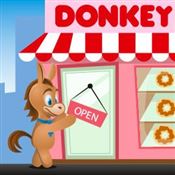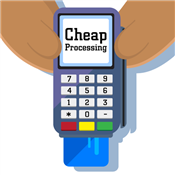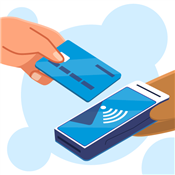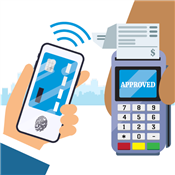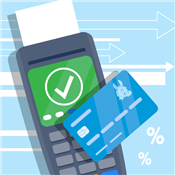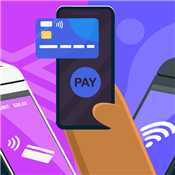Credit Card Payment Gateway
Here are examples of different types of payment gateways. Learn how they work and find the best one for your business.
 |
What Is a Credit Card Payment Gateway?
Credit card payment gateways allow businesses to accept payments online. They transfer information from a transaction on a website to the credit card networks.
Think of the payment gateway as the equivalent of the POS in a brick-and-mortar store. You need software to send the messages between all parties involved in a transaction.
The payment gateway and payment processor are two different things:
- The payment processor is the company that supplies your credit card machines, merchant account, and virtual terminal.
- The payment gateway facilitates the transaction process.
How Payment Gateways Work
Customers complete a credit card transaction on a website by entering their card information. They then get a digital receipt for the purchased goods or services. It happens in seconds, but here's what is going on behind the scenes:
- The customer's credit card information is encrypted by the payment gateway.
- The information from the transaction is sent electronically to a processor (Square, PayPal, etc.).
- The processor sends the transaction information to the credit card network or issuing bank.
- The credit card network/issuing bank approves or declines the transaction.
- The credit card network/issuing bank sends the approval or denial back to the merchant.
- The funds are deposited in the merchant's account, typically within two business days.
Why Do You Need a Payment Gateway?
If you sell goods or services online, you need a payment gateway. Without one, there's no way for the information to move from your website to the credit card network/issuing bank. The gateway also handles PCI compliance, saving you from hefty penalties and fines.
Whether you need a separate payment gateway depends on the payment processor you choose. If you use Square, for example, the payment gateway is built in since Square offers end-to-end payment processing.
Types of Payment Gateways
As a business owner, you'll need to choose the type of payment gateway you want. Here are the choices:
- Redirects/Hosted Gateways
PayPal is an example of a redirected or hosted gateway. Your customer enters the order on your website, then leaves to complete the transaction on the payment processor's site. Once the customer completes the transaction, they are redirected back to your site. - Integrated Gateways
Stripe is a good example of onsite checkout. You use a payment processor rather than your own merchant account, but your customers remain on your website. Stripe and other payment processors process the payment with their own gateway, but the customer never leaves your website. - On-site Payments
If you have your own merchant account, you handle payments onsite with your own payment gateway. This means you are in complete control of the entire transaction. But you may also be responsible for PCI compliance, which can be tricky.
The Payment Card Industry Data Security Standard (commonly referred to as 'PCI Compliance') is a set of requirements that ensure businesses handle credit card information safely and securely. This influences how companies process, store, and transmit card information.
Difference Between a Merchant Account and a Payment Gateway
Think of a merchant account as the bank account for your business. It allows you to accept credit card payments, but it doesn't transmit the data to complete the transaction. You can get a merchant account from a merchant acquirer (a bank that processes transactions on behalf of a merchant).
The payment gateway is the software used to securely transmit sensitive data. After the customer enters his or her payment data, the payment gateway takes over and completes the transaction within seconds. Without the payment gateway, the funds from the transaction would never make it to your merchant account.
PayPal is a popular payment gateway. When a customer goes to check out, they are redirected to the PayPal website where the transaction is completed.
PayPal then encrypts their credit card information and transmits it to the issuing bank/credit card network. The bank will either accept or decline the transaction based on the customer's available balance and card expiration date.
The bank then notifies PayPal, which forwards the information to you to complete or cancel the transaction.
How to Choose the Right Payment Gateway
Choosing the right payment gateway is an important decision for your business. Consider the following when shopping around:
- Hosted or Integrated
Do you want customers leaving your website to complete their payment? Hosted gateways are often free and can be set up in minutes. But you run the risk of shopping cart abandonment. Integrated gateways are more complex, but keep customers on your site. - Security
In addition to having a secure payment gateway, your customers must trust its security. Otherwise, they won't share their credit card information. Do your research and understand how the gateway encrypts information as well as how it runs its PCI compliance. - Fees
Look for any monthly fees, monthly minimums, cancellation fees, or hidden fees. - Accepted cards
What type of credit cards do you want to accept? Visa and Mastercard are common, but what about Discover or American Express? If you want to accept ACH or debit card payments, factor that into the equation, too. - Customer experience
Your customers need to feel comfortable sharing their information on your website or hosted gateway. If the gateway asks for too much information, customers may become nervous and abandon their shopping cart. - Customer support
Running an e-commerce store means you are always open, so you need a gateway that offers around-the-clock customer support. If a customer has a problem outside of normal business hours, you still need to be able to handle it quickly.
What Is the Best Payment Gateway?
The best payment gateway depends on the type of business you run and the features you need. Read on for some popular choices.
Authorize.Net
A leading independent payment gateways, Authorize.Net accepts all major credit cards, including international options. It's compatible with popular digital payments such as Apple Pay and offers a variety of plans.
If you have your own merchant account, there's no setup charge. You pay only the monthly gateway fee plus the per-transaction fees. If you need a merchant account, Authorize.Net offers an all-in-one option. But you'll pay a setup fee as well as per-transaction fees.
PayPal
If you want an all-in-one payment services provider, PayPal is a better option. The platform accepts all major credit cards and is free to set up on your website. PayPal doesn't charge monthly fees or have minimum required sales, though you do pay a fee per transaction.
PayPal provides a merchant account alongside the payment gateway. You can transfer your funds out of the merchant account and into your bank account after the funds clear according to your agreement.
There is no such thing as a free payment gateway. Every transaction incurs some type of fees, including interchange fees charged by the card networks. You may find payment gateways that don't charge setup or monthly fees (like PayPal), but expect to pay fees per transaction for any reputable gateway.
Other Payment Gateway Features
Choosing the right gateway can give you the features you need to a well-rounded business, including:
- Multiple Payment Options
Think about the types of payments you want to accept, including international, AMEX, and PayPal. - Multilanguage Options
If you accept international payments, you may need your gateway offered in multiple languages. - Multichannel Processing
To accept payments online, in-store, and on a mobile device, you'll want the payments seamlessly integrated. - Compatibility
If your gateway is separate from your payment processor, you'll need to ensure compatibility with your existing systems. - Fraud Protection
Some gateways offer fraud detection, keeping your business and customers safe. - Mobile Interface
If you operate in multiple channels, you'll want a consistent appearance across all platforms, including mobile devices. - Virtual terminal
Manually enter a customer's card info on a tablet or computer and the payment gateway processes the transaction. - Invoicing
Invoicing and subscription support makes it easy to invoice customers and collect payments all in one system. - Analytics
Easily access your business' reports on sales, chargebacks, transactions, and fees.
FAQ
How does a payment gateway make money?
Payment gateways, just like merchant accounts and payment processors, charge per transaction. Some gateways also charge monthly or setup fees.
Can you stack payment gateways?
You can have as many payment gateways as you can afford. Some merchants choose to stack gateways so they can accept all types of payments and compensate for any weaknesses that an individual gateway may have.
Can you purchase a payment gateway separate from your merchant account?
You can use any gateway as long as it's compatible with your setup. Otherwise, you'll have to factor in the cost of purchasing new equipment.
What is a credit card network?
A credit card network is the "brand" behind the card, like Visa, Mastercard, Discover, and American Express. While Visa and Mastercard credit cards are issued by individual banks, Discover and American Express come from their own card network.
What is an issuing bank?
The issuing bank is the bank that provides the Visa or Mastercard credit card. A Chase Visa, for example, is issued by Chase Bank.
Bottom Line
Choose your payment gateway carefully. It holds crucial important information for you and your customers. As such, your payment gateway needs to provide a high level of security to make your customers feel comfortable doing business with your company.
Shop around to find the gateway that offers the features, prices, and security that your business requires.
Write to Kim P at feedback@creditdonkey.com. Follow us on Twitter and Facebook for our latest posts.
Note: This website is made possible through financial relationships with some of the products and services mentioned on this site. We may receive compensation if you shop through links in our content. You do not have to use our links, but you help support CreditDonkey if you do.
Not sure what is right for your business?
|
|
|
|
|
| ||||||
|
|
|



